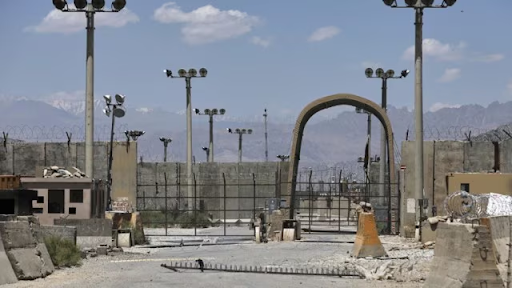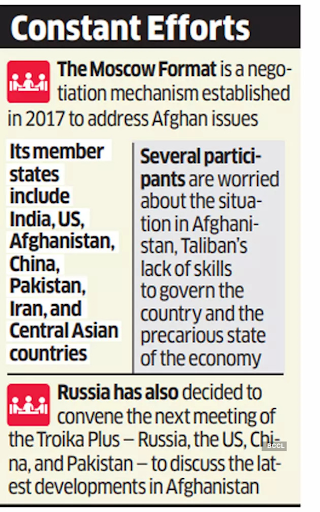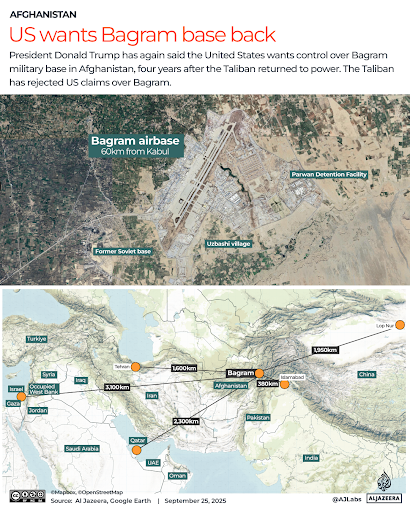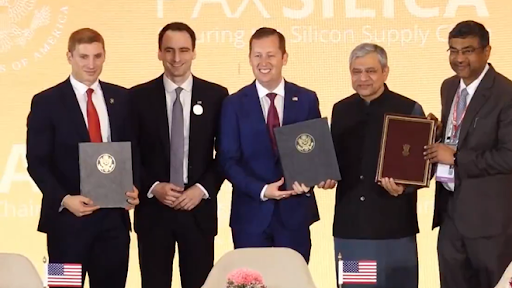



At the 7th Moscow Format, India joined Russia, China, Pakistan, and the Taliban in rejecting the U.S. plan to reclaim Bagram Air Base, calling foreign military deployment unacceptable. This marks India’s pragmatic shift toward engaging the Taliban to enhance regional stability.

Copyright infringement not intended
Picture Courtesy: INDIAN EXPRESS
India joined regional powers at the 7th Moscow Format to discuss Afghanistan’s stability and collectively opposed U.S. plans to control the Bagram air base.
|
Read all about: INDIA'S ENGAGEMENT WITH TALIBAN l INDIA-TALIBAN SECURITY DIALOGUE |
The Moscow Format Consultations on Afghanistan is a regional diplomatic platform launched by Russia in 2017, involving Afghanistan’s neighbours and key stakeholders.
Original core members were Russia, India, Afghanistan, Iran, China, Pakistan. Later, the format expanded by adding Central Asian states to increase regional representation.
Its goal is to facilitate dialogue to promote peace, stability, and development in Afghanistan, mainly after the Taliban takeover in 2021.

Held in Moscow, attended by representatives from the member countries: Afghanistan (Taliban-led government’s delegation), India, Pakistan, China, Russia, Iran, and the Central Asian states. For the first time, Afghanistan’s foreign minister participated as a full member.
Key decisions / joint statements
Reaffirmation of Afghan sovereignty, unity, independence, peace
All participants emphasised that Afghanistan should continue as an independent, united, peaceful state.
Opposition to foreign military bases / foreign military infrastructure
A joint statement rejected any attempt by countries to deploy or maintain military infrastructure in Afghanistan or in neighbouring states, saying such attempts do not serve regional peace and stability.
Emphasis on regional cooperation, counter-terrorism, economic and development engagement
The meeting also stressed economic integration, trade, investment, humanitarian assistance, connectivity, and the importance of preventing Afghanistan from becoming a base for terrorist threats to neighbours.
Criticism of U.S. claims or moves to reclaim Bagram
India’s convergence of interests with Russia, China, Pakistan, and the Taliban regime in opposing the US Plan to regain control of the Bagram air base. This reflects India's pragmatic evolution in its Afghanistan policy, prioritizing regional stability and strategic autonomy in a post-US withdrawal landscape.
Bagram is Afghanistan’s largest air base, located just north of Kabul. It once served as the main hub for U.S. military operations in Afghanistan.
Under the withdrawal of U.S. forces in 2021, the base was vacated and subsequently came under Taliban control.
Recently, U.S. President Donald Trump has made statements that the U.S. wants the base back, quoting strategic concerns — such as Afghanistan’s geopolitical location, proximity to China, etc.

Source: INDIAN EXPRESS
|
PRACTICE QUESTION Q. The Bagram air base, frequently seen in the news, is located in: A) Iran B) Pakistan C) Afghanistan D) Uzbekistan Answer: C Explanation: Bagram Air Base, also known as Bagram Airfield, is situated in the Parwan Province of Afghanistan, about 60 kilometers north of the capital, Kabul. Its location is strategically significant because the province contains key transportation routes, such as the Salang Tunnel, which connects Kabul to northern Afghanistan. |
It is a multilateral platform established in 2017 by Russia to bring regional powers and Afghanistan's stakeholders together for dialogue on the Afghan peace process and regional security.
It is Afghanistan's largest and most crucial air base, providing a strategic stronghold necessary for controlling the challenging, mountainous airspace of the region.
President Donald Trump demanded the return of the Bagram air base, citing its vital strategic location near China's nuclear facilities in western Xinjiang. He claimed the Biden administration gave up the "incredible strategic asset" unnecessarily and warned of "BAD THINGS" if Afghanistan refused to hand it back.




© 2026 iasgyan. All right reserved